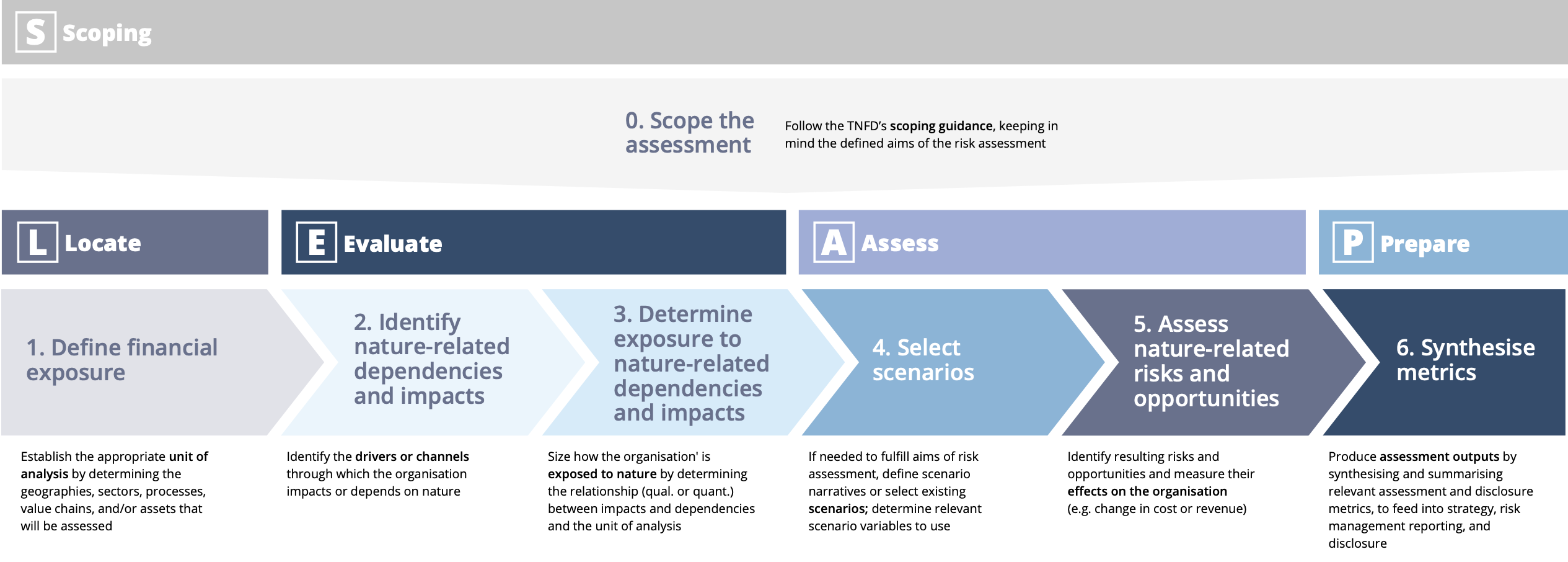New York City Climate Week ran in partnership with the United Nations General Assembly is an opportunity to collaborate with global leaders and industry experts to share knowledge, perspectives and best practices on climate resiliency. Furthermore, it enables the global south and emerging countries to have a voice at the table on the most difficult challenge of our generation, climate change.
We have identified 4 trends to focus on ahead of COP 28 and into 2024.
1. Nature and Biodiversity (Task Force for Nature-related Financial Disclosures)
With the release of final Task Force on Nature-related Financial Disclosures (“TNFD”) recommendations on September 18th, nature-related risks management and disclosures took center stage at NYC Climate week.
TNFD drafts were piloted by 200+ organizations across various sectors and geographies whose feedback has been incorporated in this final version. Included in the recommendations is the LEAP Approach (“Locate-Evaluate-Assess-Prepare”) for conducting a nature-related risk and opportunity assessment.

Making the LEAP: Three steps to get ready for the TNFD’s nature risk assessment
Market adoption is quickly following with the International Sustainability Standards Board (ISSB) and Carbon Disclosure Project (CDP) both announcing alignment to TNFD and leaders in scenario narratives announcing plans to publish reports by end of year to support with nature scenario analysis. With exciting momentum behind TNFD, the focus now is to build knowledge and capability building within organizations – specifically those most vulnerable to nature and biodiversity ecosystems from their business operations and supply chain.
2. Just Transition
It is estimated that emerging markets will need at least $1tn per year to achieve net zero by 2050, however less than 20% of current investment in emerging markets is focused on energy development and transition. There was significant dialogue across the public and private sector, focused on the need for capital deployment through recent policy actions, as well as across global south and emerging economies.
Recently, the World Bank launched the Private Sector Investment Lab, focused on bringing CEOs bringing together private finance, multilateral development banks, and development finance institutions to rapidly scale and deploy capital into urgently scale technological solutions to address complex global challenges.
The “Just Transition” was prominent, due to the limited G20 participation, which enabled the voices across the global south to speak for developing countries and contribute to the conversation. The emphasis on equitable and inclusive transition to a green economy is expected to come to the forefront, specifically related to the recent legislative actions: including, US Inflation Reduction Act (which in its latest calculation increased the total investment into climate action to $391 billion through 2031) as well as European Union’s Green Deal and it’s Just Transition Mechanism, which target to help mobilize around €55 billion in most affected regions.
3. Disclosures and Regulation
Global regulators and standards bodies are also becoming more aligned, specifically with the formation of the International Sustainability Standards Board (ISSB) and the launch of S1 and S2. IFRS S1 aims to create a comprehensive sustainability reporting standard across firms, while S2 includes industry-specific climate disclosure standards.
Meanwhile, US and global public firms are eagerly awaiting the finalized climate disclosure standards from the SEC. And while the SEC’s final climate rules are still expected to be published sometime this year, it is expected that they will align with TCFD and IFRS. In the meantime, the SEC has released an update on the “80% rule”, aimed at confirming ESG funds contain at least 80% sustainability-focused investments. Additionally, newly proposed California Legislature bills (SB253 and SB2610) aim to introduce substantial requirements for climate-related disclosures on public and private firms, including disclosure of GHG scope 1-3 emissions as well as climate-related financial risks and mitigating actions.
There is also increased interagency guidance being financed between US regulators on climate risk, with banks exceeding $100Bn or more in total assets, expected to need to comply with the proposed climate risk principles in 2024. This will require regulatory preparedness and coordination across the three lines of defence to demonstrate a credible approach on how to mitigate climate risks and capitalize on the opportunities.
4. Decarbonization
We had the privilege of attending an Investor Leadership Network (“ILN”) event, which included some of the world’s largest asset managers and asset owners. The main theme was “How to formulate a comprehensive investment strategy and the need to evaluate, engage, and decarbonize existing assets.” The discussion also covered how ILN members are investing in new assets with the aim to decarbonize them, driving real world emissions reductions and helping meet the need for over $3tn per year in investment to meet worldwide decarbonization goals.
The US Treasury also added to the decarbonization discussion, with Secretary Janet Yellen introducing nine Principles for Net Zero Finance and Investment. The principles focus on credible decarbonization commitments, including scope 3 metrics and disclosures, along with considerations for transition finance, managed phaseout of high carbon assets, and climate solutions to realize those commitments for financial institutions. This is highly aligned with the Transition Plan Taskforce (“TPT”) and other global net zero frameworks.
At Baringa, we are uniquely equipped to assist our clients in navigating these challenges, whiles seizing the opportunities as we transition into a more sustainable society. If you’re interested in learning more about these topics, please contact a member of our team.
Related Insights

Navigating the transition: How to integrate climate into strategy and decision making
We outline three things to remember when embarking on transition planning for the first time.
Read more
When risks converge, do you know how your financial dominoes will play out?
Addressing the interconnection between risks isn’t just prudent; it's essential for firms to safeguard their financial stability and remain resilient in an increasingly unpredictable world. But how can organisations go about building that all-important view of interconnecting risks and their potential impacts?
Read more
Five ways to maximise return on investment from climate scenario analysis
Conducted effectively, climate change scenario analysis can unlock strategic insights, enhance business’ climate capabilities and meet regulatory requirements.
Read more
What are three facets of a credible climate disclosure programme?
With the introduction of new sustainability disclosure standards globally, companies are needing to increase the granularity of analysis and the specificity of their disclosures.
Read moreRelated Case Studies

Future proofing ESG materiality assessments for a global insurer
How do you prepare now, to stay ahead of changing disclosure requirements?
Read more
Supporting reluctant customers to become a digital-first insurer
How did a leading healthcare cover provider overcome initial resistance from customers to encourage them to embrace new digital channels?
Read more
Leading the operational transformation that made a £4 billion insurance deal possible
How did an insurer cut through the complications of one of the biggest carve-outs in recent history to emerge stronger and better equipped for the future?
Read more
Building world-leading climate risk modelling software
How do you help the world’s biggest companies to understand their climate risks?
Read more